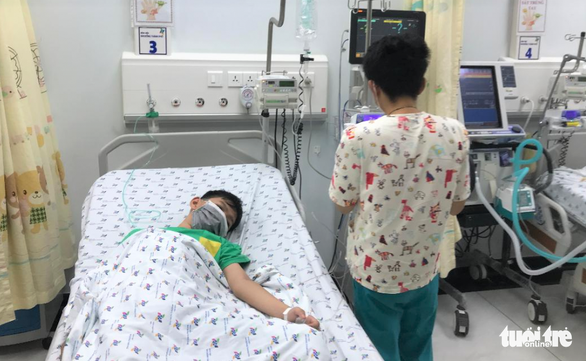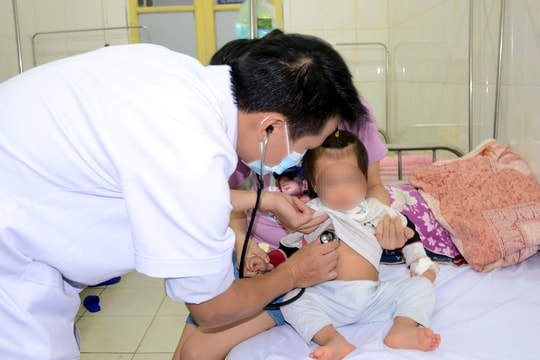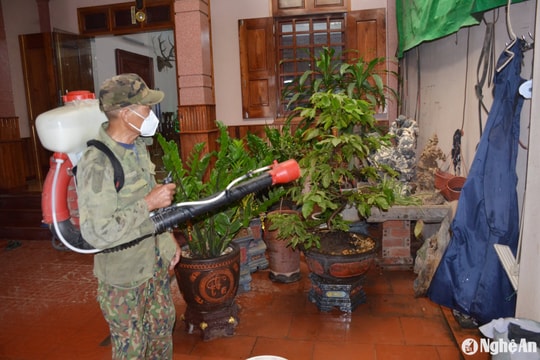'4 no's' when taking care of children with dengue fever at home
Nearly 4,500 infections, 109 severe cases from the beginning of the year to mid-April 2022 are alarming numbers about the outbreak of dengue fever. To avoid the risk of children getting worse, parents need to be careful when taking care of children with dengue fever.
Be careful when using fever reducers
 |
| A child patient was diagnosed with severe dengue shock on day 4, respiratory failure, blood clotting disorder, and was treated intensively at the City Children's Hospital (HCMC). |
Dr. Nguyen Minh Tien, Deputy Director of the Children's Hospital (HCMC), said that when a child has a fever higher than 38 degrees Celsius, they should be given Paracetamol, a single-ingredient antipyretic, at a dose of 10-15mg/kg of body weight, repeated every 4-6 hours, and not used regularly. Continuous overdose of antipyretics can lead to liver damage, including suppositories for children.
“To reduce fever, family members should dress the child in thin clothes, lie in a cool place, and apply a towel soaked in warm water. In addition, absolutely do not use aspirin and ibuprofen for infected children because these two drugs can cause severe stomach bleeding, which is life-threatening,” Dr. Tien shared.
In addition, it is necessary to supplement enough water for children. Children can drink small glasses, drink many times a day, avoid drinking too much water at once. The types of water used for children to drink can be boiled water that has been cooled, electrolyte water, fruit juice, soup...
How to feed children?
According to MSc. Dr. Do Cao Van Anh - Head of the Department of Infectious Diseases, Pham Ngoc Thach University of Medicine, when children have a fever, they will lose their appetite, so it is necessary to give them soft, liquid, easily digestible foods, many times a day, a little at each meal. If the child vomits, do not rush to feed them again immediately, they need to rest for 1 - 2 hours, when the vomiting subsides, gradually feed them less.
Give your child more water than usual: Oresol electrolyte water, filtered water, boiled water, fruit juice, orange juice, lemon juice. Provide more vitamins from fruits, strengthen immunity, resistance for the body to fight against diseases.
Along with that, it is necessary to bathe and clean the child, not abstain from water and take the child to see the doctor according to the doctor's appointment.
“The dengue virus has four different serotypes: D1, D2, D3, and D4, so people who have had dengue fever (primary infection) can still be infected with dengue several times (secondary infection) by other serotypes. Therefore, children with dengue fever can be infected again by different subtypes,” Dr. Van Anh noted.
Experts remind that when taking care of children with dengue fever at home, you need to take them to the hospital immediately when you see the following signs: cold hands and feet, lying in one place, not playing, not breastfeeding, not eating or drinking; the child has a stomachache, vomiting a lot, dry heaving; the child is fussy, restless, restless, uncomfortable or lethargic or has nosebleeds, bleeding gums or vomiting blood, black stools.
"4 no's" when taking care of children with dengue fever
Worried and anxious when their children have dengue fever, many parents often follow folk remedies, which can potentially make the disease worse. Doctor Nguyen Minh Tien advises parents:
- Do not give your child medicine without seeing a doctor because you may miss serious symptoms and become complacent.
- Do not let children drink black or red drinks like coca, sarsaparilla... because it can be confused with gastrointestinal bleeding.
- Do not scrape or cut the skin because it will hurt and can cause bleeding and infection for the child, sometimes causing the child to bleed uncontrollably.
- Do not give children with dengue fever IV fluids at private clinics or unqualified medical facilities because of the risk of shock or missing severe symptoms of the disease.





